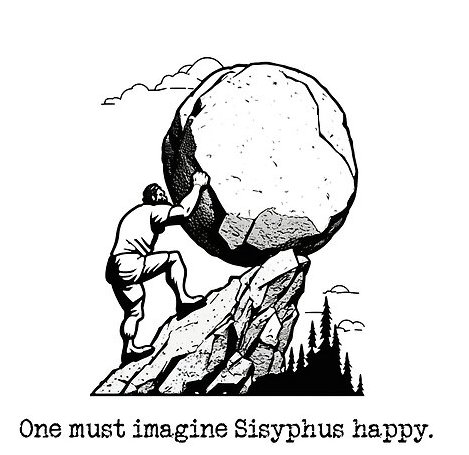Last Updated on September 23, 2024 by Iain S
The Myth Of Sisyphus

King Sisyphus, in Greek mythology, was the cunning and deceitful ruler of the city of Corinth.
He was renowned not for his virtuous leadership, but for his guile and trickery, which eventually led to his infamous punishment.
Sisyphus’s most notable transgression involved his defiance of the gods.
According to myth, he once captured Thanatos, the personification of death, preventing mortals from dying.
As a result, the natural order was disrupted, and the gods grew furious. Eventually, Ares, the god of war, intervened and freed Thanatos, restoring death to the world.
In another version of the myth, Sisyphus earned the wrath of Zeus by betraying a divine secret.
Zeus had abducted the nymph Aegina, and Sisyphus revealed her location to her father, the river god Asopus, in exchange for fresh water for Corinth.
This betrayal further cemented Sisyphus’s reputation as a schemer who would defy the will of the gods for personal gain.
Even in death, Sisyphus continued his deceit.
After being condemned to the underworld, he managed to trick Hades, god of the underworld, by convincing Persephone to allow him to return to the living world to punish his wife for improperly burying him.
Once back on Earth, Sisyphus refused to return to the underworld until the gods forcibly dragged him back.
For his countless acts of hubris and defiance, Sisyphus was condemned to his eternal punishment—rolling a boulder up a hill only to watch it roll back down, symbolizing his endless, fruitless efforts.
Albert Camus
His story serves as a cautionary tale of the consequences of hubris, but in the hands of thinkers like Albert Camus, it also became a powerful metaphor for the human condition.
The image of Sisyphus endlessly rolling a boulder up a hill, only for it to roll back down before reaching the top, has resonated with philosophers, artists, and writers alike, particularly Albert Camus.
In his 1942 essay The Myth of Sisyphus, Camus uses the myth to explore themes of existentialism, absurdity, and the search for meaning in a world devoid of inherent purpose.
Camus’s famous conclusion—“Il faut imaginer Sisyphe heureux” (“One must imagine Sisyphus happy”)—invites us to reframe the torment of the myth as a metaphor for the human condition.
In doing so, Camus offers a radical, if controversial, way to navigate the absurdity of modern existence.
The Absurd Hero
Before delving into Camus’s conclusion, it’s important to understand his philosophical concept of “the Absurd.”
For Camus, life is inherently absurd because we, as humans, seek meaning in a universe that offers none.
We crave understanding, a coherent narrative, or some divine plan that justifies our suffering.
Yet, the world remains silent in response to our quest. The gap between our desire for meaning and the world’s indifference is what Camus calls the Absurd.
Sisyphus, then, becomes Camus’s archetype of the absurd hero. His fate is the epitome of pointless labor, yet he persists.
He continues to push the rock despite knowing that his efforts will come to naught.
In this way, Sisyphus represents the human condition: We toil, struggle, love, and create, all while knowing that death renders our achievements and aspirations temporary.
According to Camus, this realization is not a call for despair but an opportunity for rebellion.
By acknowledging the absurdity of existence and continuing to live in spite of it, Sisyphus (and by extension, humanity) reclaims agency.
Camus and the Myth: “Il faut imaginer Sisyphe heureux”
Camus’s claim that “one must imagine Sisyphus happy” is the heart of his essay, and it remains as thought-provoking today as when it was first penned.
On the surface, it seems paradoxical: How can a figure condemned to an eternity of pointless labor possibly be happy?
The key, for Camus, lies in Sisyphus’s consciousness. Unlike other tragic figures who suffer without fully understanding their plight, Sisyphus is aware of the futility of his task.
Yet, it is precisely this awareness that allows him to transcend his punishment. By embracing the absurdity of his situation and continuing to act, Sisyphus affirms his existence.
Camus believed that happiness is not found in achieving one’s goals, but in the struggle itself.
The joy comes from asserting one’s freedom in the face of an indifferent universe.
In this way, Sisyphus’s defiance of his fate becomes an act of rebellion, and rebellion, for Camus, is the highest form of meaning that can be derived from an absurd world.
Sisyphus’s happiness, therefore, is not a conventional one rooted in pleasure or accomplishment.
Rather, it is the happiness of a man who, fully aware of the impossibility of success, chooses to keep going anyway.
The Relevance of Sisyphus Today
Camus’s interpretation of the myth of Sisyphus is strikingly relevant in the modern world, where existential questions loom large amid a rapidly changing, often chaotic global landscape.
In the 21st century, many people find themselves grappling with the same feelings of meaninglessness and futility that Sisyphus embodies.
Whether it’s due to the existential dread of climate change, the pressures of late capitalism, or the alienation of living in an increasingly digital, hyper-connected world, the search for meaning in a seemingly indifferent universe is a theme that resonates deeply with contemporary life.
In the workplace, for example, millions of people engage in what anthropologist David Graeber famously termed “bullshit jobs”—roles that seem to contribute little to society or, worse, feel inherently purposeless.
Much like Sisyphus, modern workers push metaphorical boulders, knowing that the system they support may ultimately be hollow.
Similarly, in a world obsessed with endless cycles of consumption and production, individuals may feel trapped in an endless quest for material success or status, which offers fleeting satisfaction at best.
However, Camus’s insights offer a way out of despair.
The lesson of Sisyphus, according to Camus, is not that we are condemned to suffer without hope, but that we are free to find meaning in the struggle itself.
Whether it is through creative expression, human connection, or acts of rebellion against systems that dehumanize us, individuals can, like Sisyphus, assert their own agency in the face of absurdity.
This defiance becomes a form of freedom, allowing us to live fully even when the universe offers no guarantees.
Can We Truly Imagine Sisyphus Happy?
Despite Camus’s poetic conclusion, his vision of happiness is not without its critics.
Some have argued that it is impossible to imagine Sisyphus—or anyone in his situation—truly content.
The idea that happiness can be found in the embrace of perpetual frustration seems to defy common sense.
To many, happiness requires more than just the acceptance of suffering; it necessitates some form of fulfillment, whether through relationships, achievements, or transcendental meaning.
Yet, Camus would counter that fulfillment itself is an illusion. We may believe that achieving certain goals—wealth, love, fame—will bring us lasting happiness, but such contentment is always temporary.
The rock always rolls back down the hill.
To expect otherwise is to misunderstand the human condition. Camus does not promise a happiness of tranquility or satisfaction.
Rather, he offers a happiness grounded in awareness and resilience—a dynamic, active engagement with life that rejects passivity.
In the end, imagining Sisyphus happy is an invitation to rethink our assumptions about happiness.
Perhaps true contentment lies not in the things we achieve, but in how we respond to the challenges we face.
The rock may roll back down the hill, but as long as we keep pushing, we affirm our existence and our freedom.
This, for Camus, is the essence of the human experience.
The Legacy of Sisyphus in the Digital Age
As we move further into the 21st century, Sisyphus’s story continues to serve as a potent metaphor for the struggles of modern life.
In an age of information overload, social media echo chambers, and the often dehumanizing nature of work, the absurd can feel ever-present.
Yet Camus’s interpretation of Sisyphus offers a powerful antidote.
We may not be able to control the systems in which we live, or the challenges that life throws at us, but we can control our response to them.
By confronting the absurd head-on and choosing to engage with life rather than retreat from it, we create our own meaning.
So, must we imagine Sisyphus happy? Perhaps not in the conventional sense.
But in the act of continuing to push the rock—in our perseverance, our creativity, and our resilience—there is a form of happiness to be found.
And in today’s world, that lesson feels more relevant than ever.
For Sisyphus merchandise to make you and your friends think.
